Premium Only Content
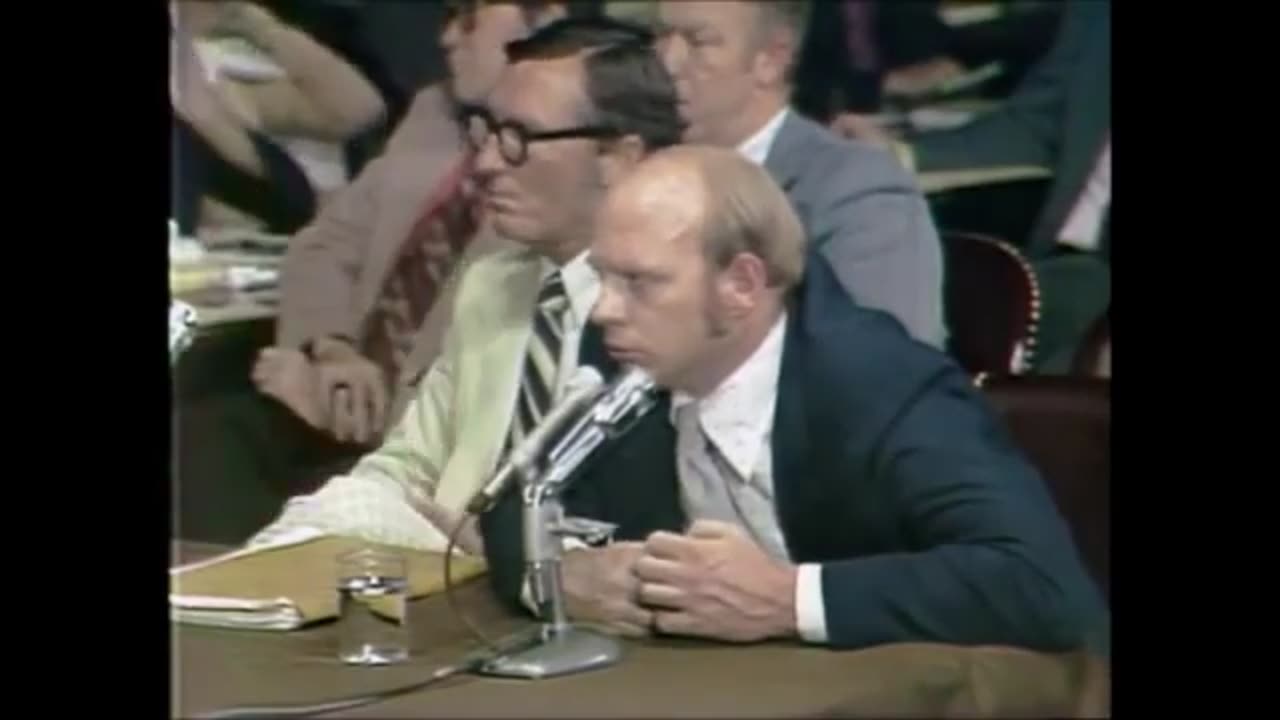
Watergate Hearings Day 42: Martin Kelly and Robert Benz (1973-10-04)
The dark side of history: https://thememoryhole.substack.com/
The Canuck letter was a forged letter to the editor of the Manchester Union Leader, published February 24, 1972, two weeks before the New Hampshire primary of the 1972 United States presidential election. It implied that Senator Edmund Muskie, a candidate for the Democratic Party's presidential nomination, held prejudice against Americans of French-Canadian descent.
The letter was a successful attempt at sabotage masterminded by Donald Segretti and written by Ken W. Clawson.[1][2] In a childish scrawl with poor spelling, the author of the Canuck letter claimed to have met Muskie and his staff in Florida, and to have asked Muskie how he could understand the problems of African Americans when his home state of Maine has such a small black population, to which a member of Muskie's staff was said to have responded, "Not blacks, but we have Canucks" (which the letter spells "Cannocks"); the author further claims that Muskie laughed at the remark. While an affectionate term among Canadians today,[3] "Canuck" is a term often considered derogatory when applied to Americans of French-Canadian ancestry in New England; a significant number of New Hampshire voters were of such ancestry.[4]
On October 10, 1972, FBI investigators revealed that the Canuck letter was part of a dirty tricks campaign against Democrats orchestrated by the Committee for the Re-Election of the President (CRP, later derisively nicknamed CREEP).[5]
The letter's immediate effect was to compel the candidate to give a speech in front of the newspaper's offices, subsequently known as "the crying speech".[6] The letter's indirect effect was to contribute to the implosion of Muskie's candidacy.
The crying speech
On the morning of February 26, two Saturdays before the March 7 primary, Muskie delivered a speech in front of the offices of the Union Leader, calling its publisher, William Loeb, a liar and lambasting him for impugning the character of Muskie's wife, Jane. Newspapers reported that Muskie cried openly: David Broder of The Washington Post had it that Muskie "broke down three times in as many minutes"; David Nyhan of The Boston Globe had Muskie "weeping silently".[7] The CBS Evening News showed Muskie's face contorted with emotion. Muskie maintained that if his voice cracked, it cracked from anger; Muskie's antagonist was the same editor who referred to him in the 1968 election as "Moscow Muskie", and called him a flip-flopper. The tears, Muskie claimed, were actually snow melting on his face. Jim Naughton of The New York Times, standing immediately at Muskie's feet, could not confirm that Muskie cried.
Denunciation
Whether true or false, fear of Muskie's alleged unstable emotional condition led some New Hampshire Democrats to defect to George McGovern. Muskie's winning margin, 46% to McGovern's 37%, was smaller than his campaign had predicted. The bounce and second-place finish led the McGovern campaign to boast of its momentum. By the time of the Florida primary, with McGovern clearing other left-leaning candidates from the field, Muskie's campaign was dead.
Washington Post staff writer Marilyn Berger reported that Nixon White House staffer Ken Clawson had bragged to her about authoring the letter. Clawson denied Berger's account. In October 1972, FBI investigators asserted that the Canuck Letter was part of the dirty tricks campaign against Democrats orchestrated by the Committee for the Re-Election of the President.[8] Loeb, the publisher of the Manchester Union Leader, maintained that the letter was not a fabrication, but later admitted to having some doubt, however, after receiving another letter claiming that someone had been paid $1,000 to write the Canuck Letter. The purported author, Paul Morrison of Deerfield Beach, Florida, was never found.
The authorship of the letter is covered at length in the 1974 book All the President's Men by Bob Woodward and Carl Bernstein and its 1976 film adaptation.
References
Bernstein, Carl; Woodward, Bob (2005). All the President's Men. New York: Simon & Schuster. ISBN 0-671-89441-2.
Bernstein, Carl; Woodward, Bob (October 10, 1972). "FBI Finds Nixon Aides Sabotaged Democrats". The Washington Post. Retrieved May 14, 2014.
Cheng, Pang Guek; Barlas, Robert (2009). CultureShock! Canada: A Survival Guide to Customs and Etiquette. Marshall Cavendish International Asia Pte Ltd. pp. 262–. ISBN 978-981-4435-31-4.
Bernstein, Carl; Woodward, Bob (2005). All the President's Men. New York: Simon & Schuster. p. 129. ISBN 0-671-89441-2.
Fawcett, Bill (2010). 100 Mistakes that Changed History: Backfires and Blunders That Collapsed Empires, Crashed Economies, and Altered the Course of Our World. Penguin. p. 289. ISBN 9781101443675.
The Crying Speech
Wilson, David B. (March 8, 1987). "Muskie's 'Tears' How The Press' Perception Can Change History". The Philadelphia Inquirer.
Woodward, Bob; Bernstein, Carl (October 10, 1972). "FBI Finds Nixon Aides Sabotaged Democrats". Washington Post. Retrieved September 27, 2009.
Further reading
David Broder, "The Story That Still Nags at Me -- Edmund S. Muskie," Washington Monthly. February 1987.
"Nixon's Nightmare: Fighting to be Believed," Time. May 14, 1973.
Theodore H. White, The Making of the President 1972.
Categories:
Election scandals in the United StatesPolitical controversies in the United StatesPolitical forgery1972 in American politicsCanada–United States relations1972 United States presidential electionAnti-Quebec sentimentPresidency of Richard NixonWatergate scandal1972 documents
Dwight Lee Chapin[1] (born December 2, 1940) is an American political organizer, businessman, and retired public servant. He was Deputy Assistant to President of the United States Richard Nixon, during the Watergate scandal. Chapin was convicted of lying to a grand jury (perjury) during the scandal and served nine months at the Federal Correctional Institution, Lompoc.
Early life
Chapin was born in Wichita, Kansas. He got his first experience in California politics in 1958 at the American Legion's Boys State summer program, where he was elected the head of the Tory Party. His counterpart, the Whig Party leader, was Stacy Keach, who went into acting as a career. Chapin graduated in 1963 from the University of Southern California, where he was a member of Sigma Chi fraternity. At USC, he was a member of Trojans for Representative Government with future Watergate scandal participants Tim Elbourne, Donald Segretti, Gordon C. Strachan, Herbert Porter, and Ron Ziegler.
Early political career
When Nixon ran for California Governor in 1962, Chapin, then still at USC, was a paid Field Man (on-the-ground organizational leader for election campaigns)[2] and worked with the volunteer organization. After the 1962 campaign, he was hired by H. R. Haldeman to work at the J. Walter Thompson Company, an advertising firm, in Los Angeles.
Chapin was part of Nixon's presidential campaign from 1967 to 1968, serving as Nixon's personal aide. Time described him as "young, athletic, religious, handsome, clean-cut, bright, ambitious, and tough."
Nixon's White House Staff
President Richard Nixon meeting with H.R. Haldeman, Dwight Chapin, John D. Ehrlichman in 1970.
He was Special Assistant to the President (1969–1971), and then Deputy Assistant (1971–1973). He was the appointments secretary, responsible for scheduling presidential activities, appointments, and travel. In addition, Chapin was in charge of the White House television office. Chapin also oversaw the hiring and the supervising of presidential advance men, and headed that group to prepare for Nixon's second trip to the People's Republic of China (P.R.C.) in February 1972 (after the first trip to Japan in 1969). In 1973, Chapin was named one of the Ten Outstanding Young Men of the year by the United States Junior Chamber (Jaycees) for his work on the historic China trips (after Japan trips). Even Chinese government were both impressed with Chapin's skill at detail work, singling him out publicly in Beijing meetings: "You are an example of how we should utilize young men in government."
Watergate Scandal
It was during this time Chapin hired Donald Segretti, his former colleague from USC, to disrupt the campaigns of Democratic presidential hopefuls during the 1972 presidential primary season through acts of political "sabotage" - known as the "dirty tricks" campaign. Chapin was asked to find a "Dick Tuck" (a legendary Democratic political saboteur) type of prankster to perform the "dirty tricks" to work under H. R. Haldeman, Nixon's Chief of Staff, and the President.
Segretti later testified before a Watergate grand jury about the activities, including Chapin's supervisory role. Chapin denied any detailed knowledge of Segretti or the activities that Segretti undertook during grand jury testimony. Segretti testified, "When Dwight hired me he made it clear he was hiring me because I was a lawyer and would know what was legal and what was not." Chapin was never indicted for any of Segretti's activities. Chapin resigned to work as an executive for United Airlines, but was drawn back into the swirl of Watergate legal proceedings.
Imprisonment
In a 1974 jury trial, Chapin was convicted of making false material declarations before a grand jury[3] and was imprisoned in the federal corrections camp at Lompoc, California (so-called "Camp Cupcake")[4] from August 1975 to April 1976. Despite the relatively minor repercussions he remained indignant, initially vowing to appeal "all the way to the Supreme Court" (which he did) in a very hostile political climate. It was later revealed that he was earning $1,000 per week while in prison, on the payroll of W. Clement Stone Enterprises.[5]
After Watergate Scandal and Nixon's resignation
After his release from prison, Chapin re-entered the private sector and worked at W. Clement Stone Enterprises in Chicago. From 1977 to 1984, he published a magazine called Success Unlimited. Chapin then worked for the international public relations firm Hill & Knowlton in Chicago. Later, Chapin had assignments in Geneva, Switzerland, Tokyo, Japan, and Hong Kong, where he was managing director, Asia, for Hill & Knowlton.
In 1986, Chapin started Chapin Enterprises. The firm provided consulting services to many prestigious companies and associations. Chapin remained involved in politics, and in 1980 worked for Ronald Reagan's election as president. In 1988, he had a position in the George H. W. Bush presidential campaign.
He has maintained an active interest in politics, and he is now a business consultant and mentor/coach in East Hampton, New York.[citation needed]. In 2022, he published a memoir titled The President's Man.[6]
References
Dwight L. Chapin Archived 2017-08-25 at the Wayback Machine. Richard Nixon Presidential Library and Museum.
"Political Organization (Field Men)".
"United States of America v. Dwight L. Chapin, Appellant, 515 F.2d 1274 (D.C. Cir. 1975)".
Carlson, Peter (May 15, 2007). "Bemoaning the Commoners at Club Fed". The Washington Post.
"Who Says Crime Don't Pay". Daily News (Kingsport). Kingsport. Reuters. April 15, 1976.
The President's Man OCLC 1300878837
External links
Appearances on C-SPAN
Political offices
Preceded by
James R. Jones
White House Appointments Secretary
1969–1973 Succeeded by
Warren S. Rustand
Authority control databases Edit this at Wikidata
NARA
Categories:
1940 birthsAmerican businesspeopleAmerican businesspeople convicted of crimesAmerican people convicted of perjuryAmerican political consultantsCalifornia RepublicansNew York (state) RepublicansLiving peopleNixon administration personnelPeople convicted in the Watergate scandalPeople from Wichita, KansasUniversity of Southern California alumni
-
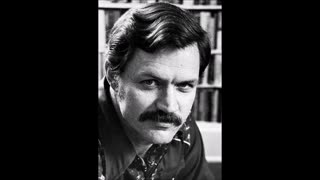 54:05
54:05
The Memory Hole
12 days agoThe CIA Exposed: How the World Is Run - John Stockwell (1987)
5563 -
 1:11:38
1:11:38
Film Threat
6 hours agoCHRISTMAS DAY CHILL STREAM WITH CHRIS GORE | Hollywood on the Rocks
59.7K19 -
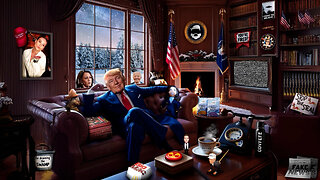 14:22:40
14:22:40
The Quartering
1 day agoYule Log Christmas MAGA Edition With Memes! Come Hang Out!
150K22 -
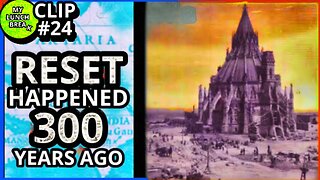 38:41
38:41
MYLUNCHBREAK CHANNEL PAGE
1 day agoTimeline Begins in 1800? - Pt 1 & 2
52.7K35 -
 1:23:41
1:23:41
Game On!
1 day ago $10.18 earnedNetflix NFL Christmas Games Preview and Predictions!
61.1K9 -
 2:05:07
2:05:07
Darkhorse Podcast
1 day agoWhy Trump Wants Greenland: The 257th Evolutionary Lens with Bret Weinstein and Heather Heying
292K463 -
 8:50:58
8:50:58
Right Side Broadcasting Network
1 day ago🎅 LIVE: Tracking Santa on Christmas Eve 2024 NORAD Santa Tracker 🎅
353K51 -
 2:48
2:48
Steven Crowder
1 day agoCROWDER CLASSICS: What’s This? | Nightmare Before Kwanzaa (Nightmare Before Christmas Parody)
324K13 -
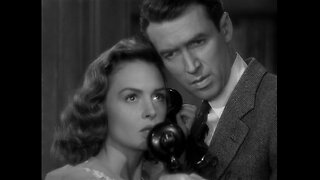 33:49
33:49
Quite Frankly
1 day agoThe Christmas Eve Midnight Telethon
123K22 -
 2:12:46
2:12:46
Price of Reason
1 day agoAmber Heard BACKS Blake Lively Lawsuit Against Justin Baldoni! Is Disney CEO Bob Iger in TROUBLE?
73.2K24